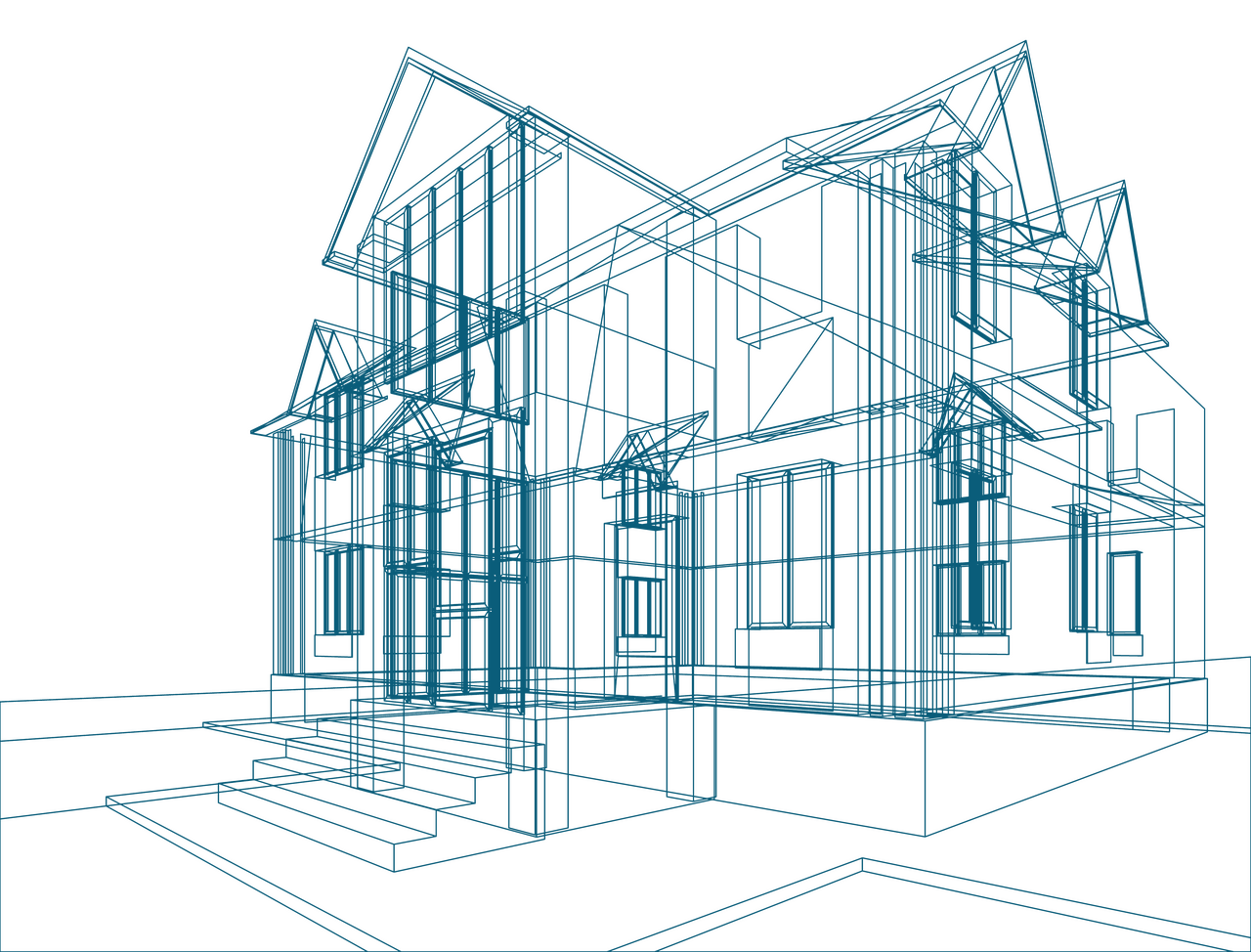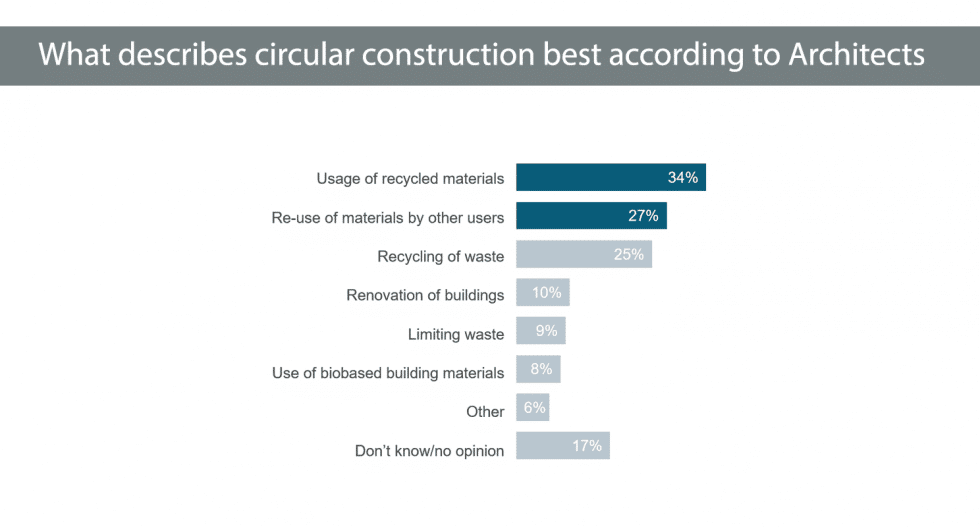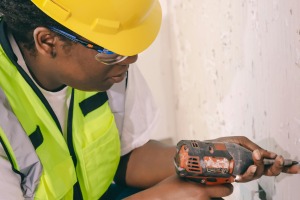


Market report
Architects in sustainable construction
Gain valuable insights on the European architectural industry trends and market analysis with the European Architectural Barometer report. Stay informed and make informed decisions in the architectural sector.
News I published 20 June 2022 I Dirk Hoogenboom
Architects link circularity mainly to material aspects
European architects are more aware of and involved in sustainable construction than in circular construction, as we saw in a previous article. Still, 75% of architects from the eight countries involved in the quarterly European Architectural Barometer are aware of circular construction and 29% claim their company is actively involved in it. But what do they actually mean when talking about circular construction?
That is one of the questions answered in the Q1 2022 report of USP Marketing Consultancy’s European Architectural Barometer. During the interviews with the architects, before we provided them with a definition of circularity, we asked not only whether architects were aware or involved in circularity, but also how they describe circular construction.
Architects link circularity mainly to material aspects


The descriptions architects associate with circularity the most revolve around reusing materials, using recycled materials, and recycling waste. Limiting waste and using bio-based materials were also in the top six of descriptions associated with circular construction. This clearly shows that in their definition of circularity, architects mainly link the concept to the materials used for building construction.
Circularity involves much more than reusing materials
After asking the questions mentioned above, we provided the architects with definitions of circularity and circular construction. We explained circular economyas a system aimed at the continual use of resources and eliminating waste. In circular building construction, all parties involved in the building cycle process take minimising the use and maximising the reuse of building materials and of the buildings themselves into account in every step from the very start of the construction process.
Although using recycled materials is an important aspect of the concept, circular construction involves much more than just the reusability of materials. It also involves reusability of larger products consisting of those materials and thinking of the reusability of entire buildings already in the design phase of the construction process.
A high level of integration of circularity in the building construction process could involve maximising the lifespan of a building, for instance by integrating into the design possible purposes for the building for after it has fulfilled its initially intended purpose. Reusability can also be established by a design that allows a building part to easily be demounted and remounted.
See concepts through the eyes of architects
With the exception of renovation, these aspects of circular construction that involve the reusability of entire buildings or building parts were barely mentioned by architects. For manufacturers of construction materials and products, this is an example of how important it is to truly understand what certain concepts mean to your target groups.
Their view on and definition of broad concepts like circularity and sustainability may differ from your own definition on which you base your marketing and sales strategies. All the more reason to see those concepts through the eyes of your target group. For a full overview of the view on and ideas about sustainability and circularity of architects from eight European countries, we refer you to the Q1 2022 report of USP Marketing Consultancy’s European Architectural Barometer.

Read more


12 December 2024 I Dirk Hoogenboom
Buying Behavior of Handymen


12 December 2024 I Henri Busker
Handymen Radar – Private Labels vs. Branded Products


12 December 2024 I Dirk Hoogenboom
Sustainability and Painting – What Matters Most?


12 December 2024 I Zeynep Kutsal
Are European Painters Getting Younger?

Fresh Insights Await
Our relevant reports
Delve into the newest findings across various market segments, crafted for a cutting-edge overview. Explore our insightful reports, brimming with up-to-date data, trend analyses, and in-depth examinations, all tailored to provide you with a comprehensive understanding of the current market dynamics.
Construction
Home Improvement
Installation
Special reports
Construction
Smart Materials and Buildings Q4 2024
2024 85 pages
Explore the evolving future in construction sector among European architects in Q4 2024. Delve into the factors driving material preferences and the impact on construction aesthetics and sustainability.
2,000 Euro
Construction
Digitalisation and BIM H2 2024
2025 64 pages
Uncover the preferred purchase channels of contractors in H2 2024, and understand how purchasing behaviors evolved. This report provides insights into the factors influencing purchasing decisions among contractors.
6,000 Euro
Construction
Decision making process Q3 2024
2024 87 pages
Unveil the decision-making processes in the construction industry through the lens of European architects. Discover the factors that influence crucial decisions and the interplay among different stakeholders.
2,000 Euro
Construction
Prefab H1 2024
2024 63 pages
Discover the adoption rate and benefits of prefabrication technology among European contractors in H1 2024. Understand the driving forces behind prefab usage and its impact on project efficiency and cost-saving.
6,000 Euro
Construction
Future of construction Q2 2024
2024 82 pages
Explore the evolving future in construction sector among European architects in Q2 2024. Delve into the factors driving material preferences and the impact on construction aesthetics and sustainability.
2,000 Euro
Construction
Sustainability 2024
2024 72 pages
Painter Insight Monitor 2024 will focus on understanding the specific needs, preferences, and challenges faced by painters when it comes to sustainable products.
11,000 Euro
Home Improvement
DIY vs DIFM Q4 2024
2025 76 pages
Explore the prevailing trends between DIY and DIFM in Q4 2024. Understand consumer preferences and the factors influencing their choice between DIY and DIFM.
3,500 Euros
Home Improvement
Branding Q3 2024
2024 74 pages
Discover the power of branding in the home improvement sector. Explore how strong branding influences consumer preferences and purchase decisions.
3,500 Euro
Home Improvement
European Garden Monitor
2023 43 pages
Explore the European Garden Monitor, a comprehensive platform dedicated to garden health monitoring in Europe. Access valuable resources and expert advice today.
12,000 Euro
Home Improvement
Purchase channels Q2 2024
2024 90 pages
The European Home Improvement Monitor offers valuable insights on purchase channels in the European home improvement industry, examining the evolving preferences and behaviors of consumers across traditional retail and emerging online platforms.
3,500 Euro
Home Improvement
Sustainability Q1 2024
2024 81 pages
Delve into sustainability trends in the home improvement sector in Q1 2024. Discover consumer preferences and the shift towards eco-friendly home improvement solutions.
3,500 Euro
Home Improvement
DIY versus DIFM Q4 2021
2024 113 pages
This report is a must-have if you’re in the home improvement industry. It provides a wealth of information on the behaviour of DIY and DIFM consumers, their motivations, and the factors that influence their purchasing decisions.
3,150 Euro
Installation
Training needs Q1 2025
2025 100 pages
This report offers an overview of installers’ habits and preferences concerning their education. Furthermore, the report encompasses the pervasive challenge of workforce shortage and explores the sector’s strategies for resolving this issue.
3,250 Euro
Installation
Media orientation Q4 2024
2025 128 pages
The European Mechanical Installation Monitor report provides a detailed analysis of the plumbing and HVAC industry. This report specifically focuses on Media Orientation in the industry.
2,800 Euro
Installation
Services in the installation sector Q4 2024
2025 102 pages
This report provides a comprehensive view of the installer's requirements for services from manufacturers. Within the report, you will find information on the most needed services in each category: commercial processes, engineering, products & installation, and repair & maintenance. It also examines the services that installers offer to their customers.
3,250 Euro
Installation
Prefab Q3 2024
2024 110 pages
Uncover the adoption of prefabricated products in HVAC installations during Q2 2022. Delve into the benefits and challenges associated with prefabrication in HVAC.
2,800 Euro
Installation
Prefab Q3 2024
2024 119 pages
This report offers a comprehensive view of the installers’ involvement and needs regarding prefabricated electrical installations.
3,250 Euro
Installation
Smart & Connected Products Q2 2024
2024 120 pages
This report provides a comprehensive view of the attitudes of installers toward smart building solutions, specifically among electrical installers and their clients. In the report, you will find insights into the installers' experiences with installing smart products and the willingness of end users to invest in such solutions, as well as their motivations and pain points.
3,250 Euro
Special reports
European Sustainability Report 2024
2025 51 pages
This report provides in-depth insights based on triangulation of key market information and data as well as data from USP Marketing Consultancy’s key monitors that are carried out year in, year out. The focus of this report is on the most important stakeholders within the construction industry, namely architects, contractors, electrical and HVAC installers within The United Kingdom, The Netherlands, Belgium, Germany, Poland, France, Italy, and Spain.
3,950 Euro
Special reports
European Sustainability Report 2024
2024 51 pages
This report provides in-depth insights based on triangulation of key market information and data as well as data from USP Marketing Consultancy’s key monitors that are carried out year in, year out. The focus of this report is on the most important stakeholders within the construction industry, namely architects, contractors, electrical and HVAC installers within The United Kingdom, The Netherlands, Belgium, Germany, Poland, France, Italy, and Spain.
3,950 Euro









